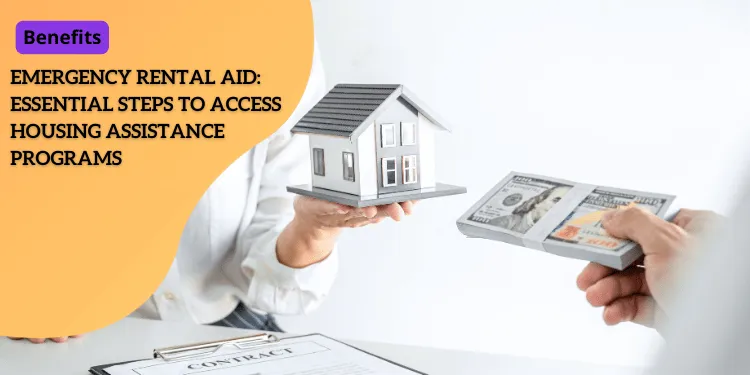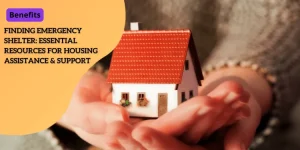Emergency Rental Aid: Essential Steps to Access Housing Assistance Programs

Anúncios
Overview of Emergency Rental Assistance Programs
Emergency rental assistance programs are designed to provide crucial help to renters who are facing unexpected financial hardships and struggling to pay their rent.
These programs aim to prevent evictions and homelessness by offering temporary financial aid to those in need.
Anúncios
They are administered by state, local, and federal agencies and funds can typically cover overdue rent, utility payments, and sometimes even future rent for a limited period.
Importance of Immediate Action When Facing Rental Challenges
When you find yourself in a situation where you’re unable to pay rent, taking immediate action is key.
Anúncios
Delaying the process can exacerbate your financial dilemmas, making it harder to resolve them.
Contacting your state’s 211 program immediately can help you understand the resources available and begin the application process.
Taking prompt steps towards accessing assistance not only alleviates stress but also increases your chances of receiving the aid before your situation becomes dire.
 If you need assistance, call
If you need assistance, call
Basic Eligibility Considerations for Rental Assistance
While each program has its own set of criteria, there are common eligibility considerations you should be aware of.
Generally, to qualify for emergency rental assistance, you may need to:
- 💸 Demonstrate financial hardship, such as a loss of income due to job loss, medical emergencies, or increased expenses.
- 💸 Provide proof of income to verify that your household’s earning falls below a specified threshold.
- 💸 Show documentation of your rental arrangement, such as a lease agreement or a statement from your landlord.
- 💸 Submit evidence that you are at risk of eviction or struggling to meet your rental obligations.
Understanding these basic eligibility factors can help you gather the necessary documentation and information before applying, making the process smoother and more efficient.
If you don’t meet the criteria for government programs, state or local agencies often refer you to community or nonprofit organizations that may be able to assist.
Accessing the 211 Program
Role and Function of the State’s 211 Program
When facing rental challenges, the 211 program serves as a critical resource.
This statewide service connects individuals to essential resources and helps navigate emergency rental assistance options.
Operated by United Way and other community organizations, the 211 program offers a lifeline for those in urgent need of aid, including rental assistance, food, and utility services.
By providing an accessible helpline, 211 coordinators can direct callers to local agencies and charities that offer immediate support and financial assistance.
Additionally, the program assists with eligibility screenings to streamline the application process for government-based rent assistance programs.
How to Contact 211 Services in Your Area
Contacting the 211 services is straightforward and can be done via phone or online.
- 📱 Phone Contact: Simply dial 2-1-1 from any phone. This toll-free number connects you to a local operator who can assist with your specific needs.
- 📱 Online Contact: Visit the 211 website and use the online chat or email options to get help. This site also provides a searchable database of programs and services available in your area.
What Information to Have Ready When Calling 211
Having the right information ready when calling 211 can expedite the assistance process. Here is a checklist to guide you:
- 📌 Personal Identification: Be prepared to provide your full name, date of birth, and social security number.
- 📌 Contact Information: Have your current address and a reliable phone number available.
- 📌 Proof of Income: Gather recent pay stubs, bank statements, or any documentation that proves your financial situation.
- 📌 Lease Agreement: Have a copy of your rental agreement or lease handy.
- 📌 Landlord Contact Information: Know your landlord’s name and contact details.
- 📌 Explanation of Need: Be ready to explain your current situation and why you need assistance.
Being well-prepared ensures the 211 operators can promptly direct you to appropriate resources and support services.
This preparation also helps in smoother transitions when coordinating with other agencies and may quicken the aid process.
By leveraging the 211 program, you can gain immediate access to rentals assistance and other critical services.
Understanding how to effectively communicate with the 211 helpline can significantly ease the stress and urgency of financial hardships, providing you with the necessary aid when you need it most.
Navigating State-Specific Requirements
Understanding that Eligibility Rules Vary by State
When it comes to emergency rental assistance, know that each state has its own set of rules and regulations.
This means the criteria you need to meet can differ significantly depending on where you live.
Thus, it’s vital to thoroughly understand your state’s specific requirements to ensure you qualify for the aid you seek.
Before you start your application, check your state’s housing or social service agencies’ website for detailed information.
Consulting the 211 resource in your state can provide vital guidance and direct you to the appropriate contacts.
This initial step could save you time and greatly enhance your chances of successfully obtaining assistance.
Importance of Checking Your Specific State’s Criteria
It’s crucial to carefully verify the criteria for your specific state to avoid unnecessary delays or denials.
Begin by checking:
- ✔️ Income limits specific to your area
- ✔️ Required documentation proving your financial hardship
- ✔️ Deadlines for applications and fund disbursement schedules
- ✔️ Additional state-specific qualifications, such as citizenship status or proof of residency
Staying informed about these criteria will help you gather the right documents and complete your application correctly, increasing your likelihood of approval.
Documentation Typically Needed for Application
Most states will require similar documentation to process your emergency rental assistance application.
Here’s a list of commonly requested documents:
- 📄 Personal identification (government-issued ID)
- 📄 Proof of income (pay stubs, unemployment benefits, etc.)
- 📄 Lease agreements or rental contracts
- 📄 Recent bank statements
- 📄 Proof of hardship (e.g., job loss notification or medical bills)
- 📄 Landlord’s contact information and lease terms
Having these documents ready ahead of time will streamline your application process.
Furthermore, ensure that all paperwork is up-to-date and accurately reflects your current situation to avoid any potential issues or delays.
Navigating the specifics of your state’s requirements can feel daunting, but it’s a crucial step in securing the rental assistance you need.
By taking the time to understand and adhere to these state-specific guidelines, you set yourself up for success in accessing vital support.
Alternative Assistance Options
Community Organizations and Nonprofit Resources
When facing rental assistance challenges, community organizations and nonprofits can be invaluable.
These entities often offer programs and services tailored to providing short-term financial help, counseling, and support to those in need.
Local charities, such as food banks or religious organizations, may also have rental assistance funds or can connect you to other resources.
Organizations like the Salvation Army, Catholic Charities, or the United Way frequently provide rental assistance programs and support services.
Referral Process through State and Local Agencies
If you do not qualify for government programs, state or local agencies can aid in connecting you to alternative resources.
When you contact your state’s 211 program, they not only help with government assistance but also refer you to community and nonprofit organizations that support rental assistance.
These agencies understand the local landscape of available resources and can guide you through the process of accessing emergency funds, financial counseling, and other support services.
Options Available When Not Qualifying for Government Programs
Not all renters will meet the criteria for government rental assistance programs, so exploring alternatives is crucial.
Besides community and nonprofit organizations, look into the following options:
- 🌐 Crowdfunding: Platforms like GoFundMe can help you raise emergency funds from friends, family, and your broader community.
- 🌐 Local Grants: Some cities and counties have special funds or grants for residents facing eviction. Check with local government offices or community action agencies.
- 🌐 Employer Assistance: Some employers offer emergency financial aid or loans to their employees in times of crisis.
- 🌐 Churches and Faith-Based Organizations: Many local churches have funds set aside to help members of their community in need.
By being proactive and considering all available resources, you can increase your chances of obtaining the help you need to stay in your home.
This multi-faceted approach is essential when government programs are not an option.
Transitioning to the next topic, it is also beneficial to understand how housing counselors can assist during these times of need.
Working with Housing Counselors
Benefits of Consulting with a Housing Counselor
When faced with rental assistance challenges, consulting with a housing counselor can be extremely beneficial.
Housing counselors are professionals trained to offer advice and support to individuals struggling with housing issues.
Their expertise can help you navigate the complexities of applying for rental assistance programs, understand your rights as a tenant, and provide guidance on financial management.
Some key benefits of working with a housing counselor include:
- 🏠 Personalized Guidance: They offer tailored advice based on your specific situation, ensuring you receive the most relevant information and resources.
- 🏠 Stress Reduction: Navigating rental assistance can be stressful. A housing counselor can help ease your burden by walking you through the process and addressing any concerns you may have.
- 🏠 Resource Connection: They have access to a wide range of resources, including community programs, nonprofit organizations, and alternative assistance options.
- 🏠 Mitigation of Eviction Risks: Housing counselors work to prevent eviction by helping you understand and utilize all available assistance resources.
How to Connect with Qualified Housing Counselors
Connecting with a housing counselor is straightforward. Here are some steps to help you find a qualified professional:
- 🏘️ Contact the 211 Program: Dial 2-1-1 on your phone or visit their website to get a referral for a housing counselor.
- 🏘️ HUD Website: Visit the U.S. Department of Housing and Urban Development (HUD) website, which maintains a list of approved housing counseling agencies.
- 🏘️ Local Nonprofits: Check with local nonprofit organizations that focus on housing issues, as they often offer or can recommend counseling services.
- 🏘️ State and Local Agencies: Inquire with state or local housing agencies for recommendations.
It’s important to ensure that the housing counselor you choose is certified and reputable.
Look for counselors approved by HUD or recommended by the 211 program for the best support.
What to Expect from Housing Counseling Services
When you engage with a housing counselor, it’s helpful to know what to expect from the services they provide.
Here’s an overview:
- 📞 Initial Consultation: An initial meeting will assess your financial situation, identify challenges, and set goals. This may include reviewing your income, expenses, and current housing issues.
- 📞 Action Plan Development: The counselor will work with you to create a plan that addresses your immediate housing needs and outlines steps to prevent future issues.
- 📞 Resource Identification: They will connect you with local resources and programs that provide financial assistance, legal help, or other necessary support.
- 📞 Follow-Up Sessions: Regular check-ins to monitor your progress and adjust the action plan as needed. These sessions ensure you stay on track and continue to receive appropriate help.
Housing counseling is an ongoing relationship aimed at stabilizing your housing situation and providing long-term solutions.
The right counselor can make a significant difference in your ability to maintain housing and avoid eviction.
Working with a housing counselor can provide peace of mind and practical support. As you navigate your rental assistance journey, they can be invaluable allies in helping you secure and maintain your housing.






